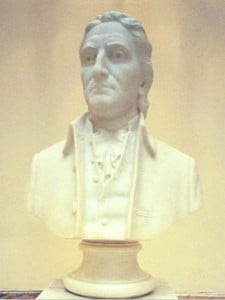Lyman Hall (April 12, 1724 – October 19, 1790) was a man of many vocations. He had experience as a physician, clergy, and statesman. He would attend the Second Continental Congress along with his fellow delegates, George Walton and Button Gwinnett. He would vote in favor of independence and become a famous signer of the Declaration of Independence.
Early life and family

Lyman was a class of 1747 graduate from Yale and, in 1749, would serve as a pastor of Stratfield Parish. His pastorate at Stratfield was short-lived, but he would continue to fill vacant pastoral positions while studying medicine and teaching school. Over time, he developed his skills in medicine and received an M.D.
In 1753, Lyman Hall's wife of one year, Abigail Burr, passed away. The loss was sudden and hurt him much. After time had healed his wounds, he married Mary Osborne in 1757. Shortly after the marriage, Lyman Hall and his wife Mary moved to South Carolina around the Charleston area in Dorchester. Here, he would prove himself as a capable physician.
The Dorchester area had been settled by Congregationalists from the Puritan Dorchester, Massachusetts Bay, some 20 years earlier. While here, Hall became an influential person within the community. The settlers then planned another move from South Carolina into the colony of Georgia, and he accompanied them. He helped found Sunbury and would become one of the leading figures within the settlement.
American Revolutionary War
Compared to the other 13 original colonies, Georgia was young and had more loyal ties to Britain. Even though Georgia was predominately made up of loyalists, Sunbury was a hotbed of radical sentiment. Under Hall's influence, he persuaded St. John's Parish to send a delegate to the Second Continental Congress. They responded by sending him to Philadelphia, Pennsylvania, in 1775. He would hold this seat for 5 years and become one of the three Georgians to sign the Declaration of Independence.
In January 1779, Hall's family fled North after Sunbury was burned by the British. Hall and his family remained in the north until the British evacuation in 1782. The town of Sunbury was burned and devastated by the American Revolutionary War. Upon his return to his native Georgia, Hall and his family decided to plant new roots in Savannah. Having the notoriety of a Signer of the Declaration of Independence, Hall continued his life of public service. He was elected as the chief magistrate of the new state of Georgia and held that position for a year. During his tenure, he helped found the University of Georgia. He believed that education, specifically religious education, would encourage virtue within its citizens. After his term of governor expired, Hall returned to his medical practice. Thus ending his service to his country. He would not take part in the signing of the Articles of Confederation or the Constitution of the United States of America.
Death and Legacy
After returning to his medical practice, Lyman Hall would die in 1790 at the age of 66. His wife Mary would survive him for 3 more years and then die in 1793. He survived long enough to see the newly formed nation elect George Washington as its first President and solidify itself as an independent nation.
Charles Goodrich, in his book Lives of the Signers of the Declaration of Independence, said this about Lyman Hall:
Doctor Hall, in his person, was tall and well-proportioned. In his manners, he was easy, and in his deportment, dignified and courteous. He was by nature characterized for a warm and enthusiastic disposition, which, however, was under the guidance of a sound discretion. His mind was active and discriminating. Ardent in his own feelings, he possessed the power of exciting others to action, and though in Congress he acted not so conspicuous a part as many others, yet his example and his exertions, especially in connection with those of the inhabitants of the circumscribed parish of St. John, powerfully contributed to the final accession of the whole colony of Georgia to the confederacy; thus presenting in array against the mother country the whole number of her American colonies.

